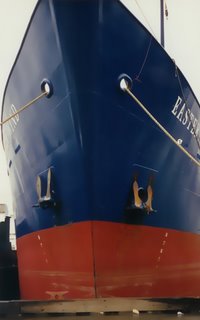
Sustainable communities trumps privatization, or why is government not going our way?
October 13th, 2006
"We encourage people to share their ideas on practical solutions to move toward a sustainable community" This is on the minds of a number of people in fishing communities, not all, but some. Communities need to be viewed as a business enterprise, not just a flat spot for developers to build houses. They are an economic engine.

My favorite photo of how fishing gets so unsustainable.
City councils in the ports should put a big sign over the mayor's chair that says, "Healthy fishing makes healthy fishing families, which makes a healthy community." This article from Maine depicts what happens when the fishing isn't healthy. That statement takes into all the factors: fishing methods, global warming, predator/prey relationships, ecosystem health, and lastly abundance of the cash crop.
Notice that in the Maine article the chief fishing method is trawling. The pressure on politicians back East has been to let'em trawl. I think at times that if all stops were taken off, trawlers there would sweep the bottom, the mid-water and the shoals of fish clean. That aside, compare their methods of catching fish with the methods they use in Florida, hook and line for the most part. Florida has an economic recreational and commercial fishing engine worth well over $5 billion a year. Maine has zip, it sounds like.
Trawling was never as effective as it is now. The new synthetic nets and winch systems can pull up a net full of boulders as well as fish. And the electronic systems used to find fish is close to that used on a sub-chaser. You gotta stand in the wheelhouse of one of the big factory trawlers to appreciate what it might be like standing on the bridge of a U.S. Navy destoryer.
Not that the fish-finding electronics can tell a herring from a pollock. There has been times in the Bering Sea when a hundred tons of herring or the wrong size pollock were caught by mistake. Oops. The factory isn't geared for that so just spill them out. Of course they are all suffocated in the cod end and dead as a mackerel. Although Alaska by-catch is just as dead as East coast lobster by-catch.
Of all the nutty things, the big fight is over whether these bulldozers of the ocean will be allowed to keep all the illegal species they catch. If drivers got to swerving over and clipping pedestrians on the curb, the solution wouldn't be to put foam on the front of the cars. It would be to stop the destructive practice. Just because the trawler drivers are like foreign diplomats, it doesn't mean something shouldn't be done about the practice.
Trawling embodies the epitome of the thrill of the chase. It's fun to play with all the electronics, the boat can be big and comfortable and safe, even in the worst weather. The quantities of fish you can catch are enoumous and thrilling. And the payoff is good for the owners. You know, economies of scale and all. The next step is just to use some of those immense profits to get the lawmakers to give you more play time on the ocean.
There have been organizations dedicated to stopping bottom trawling for decades. The damage they do is not unknown. Just not passed around that much. But the good news is that, like any horde of locusts, they will eat themselves out of house and home. Just ask a gas station attendant in Bangor, Maine. And it's not like a bunch of fisheries in Alaska didn't get "fried" either, mostly because the fishery managers were too timid to stand up to the industrial scale buffalo hunters.
Actually, now that I think about it, I kinda hope that the fishing industry never does get it's act together. It's such lurid stuff to write about that it's easy to get "page views." So, have at it boys, drop them 10 ton trawl doors and let 'er out for some more clear-cutting of the ocean floor. Scrape 'er clean so it will be a moot point that the local boats got "co-opted" out. Out of their entire fishery, and their mortgages, and any fishing port in the country.
On the other hand, communities themselves could get their act together and do what Lincoln County in Oregon is doing. Organizing to look at what is going to sustain them in the long run. If they need studies they will get them. If they need support in the Capital, they will go to other coastal counties, and so on. But what they aren't going to do is sit on their duffs and let circumstances, (buffalo hunters and politicians) overtake them.
I think Lincoln County finally realized that the local fishermen were never going to get together in the form that would be effective insurance against catastrophic industry decline. The fishermen have a chance in Alaska to be that insurance, if they embrace the RSDA concept that the Legislature handed them. At the moment very few fishermen understand what it can do for them. And the Boroughs are even more in the dark. The City Managers are just worried about keeping water pressure in the mains and the Mayors. Where are the Mayors.
Usually the Mayors are just trying to get their feet under them since the turn-over of Mayors is high. They never get time to look into broader issues. But a good Mayor would say the first day in office, "Bring me the Business Plan for the City." If past mayors haven't left the town's fate to the travel agents and fish house people, there might be one laying around. A good start in making sure things aren't happening around them that would render the town unsustainable. Citizen should demand to see the "business plan" with it's description of external threats and competition included. Don't settle for "the strategic plan" that seems to be so prevalent.
"Strategic plan" and "economic development" are phrases that leave the door wide open to a real stew of gobbledy-gook. Not that a good community planner couldn't use these phrases just so folks don't think he's in left field. But these plans need to look for the "fatal flaw" that might catch them up. I addressed the Petersburg, AK City Council on fisheries infrastructure once and said if you don't remember anything of what I said, just remember the concept of the fatal flaw. Three minutes flat into their regular meeting they canned the waste management plan they were looking at.
I think the fatal flaw for many fishing communities has been to ignore the concept of sustainable fisheries practices. Even in little Petersburg, there used to be mass quantities of smelt and herring in the harbor, which attracted king salmon and who knows what all. Then one day a local fish processor sent out some boats and wiped them all out. The boats and plant had just geared up for spring roe herring fishing with the latest technology and thought a little practice would be fun I guess. A middle of the winter, middle of the night type of fishery, but only a couple of miles from what was once good fishing off the docks.
See more at John Enge's BlogSee John Enge's Previous Posts On AlaskaReport Here
John lived in Alaska for 50 years and has run commercial boats and processing plants. John also served as a loan officer and economist for a "fishing bank" and served as the only Fisheries Infrastructure Development Specialist the state has had. He has owned a marine design and fabrication business and created the best-selling "Passport Alaska." All photos on his blog are his own, unless so noted.
Contact John Enge
